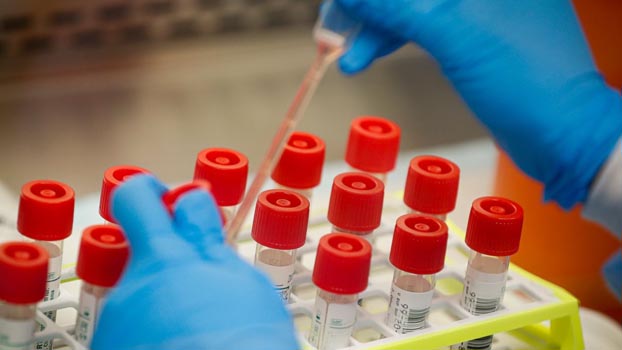Kit, lab shortage hampers virus tests

Efforts to contain the spread of Covid-19 in Bangladesh are being hampered severely due to shortage of testing kits and inadequate number of laboratories, said experts.
In this circumstances, experts have suggested for the engagement of more non-government organisations and private hospitals in testing and treatment of coronavirus.
According to information received from different sources, personnel involved in the coronavirus testing activities are struggling hard to tackle the huge rush of people.
Sources said, test results are often delayed and it creates panic among people. Moreover, the number of test report is very less in compared to the number of samples collected every day.
On the other hand, in many cases, samples could not be collected while many samples remain untested due to the shortage of test kits and laboratories, sources added.
It should be mentioned that there are only 65 laboratories to conduct Covid-19 tests across the country. But many of them cannot conduct their activities everyday due to faulty machines. Besides, many other hospitals cannot conduct test due to shortage of kits.
According to the Directorate General of Health Services (DGHS), as of Wednesday, the country tested 660,444 samples and the number of daily test is still less than 20,000.
According to www.worldometers.info, 4,029 out of every one million people in the country have so far been tested, whereas the number is 89,351 in the United States, 83,585 in Italy and 5,329 in India.
The government has managed to test only about one out of every 250 people, which is direly inadequate to get any conclusive picture of the real Covid-19 situation, said experts.
However, the 300-bed government hospital in Narayanganj is one of the places where testing remained suspended for five days from last week amid kit shortage.
In Gazipur, Shaheed Taj Uddin Ahmad Medical College authorities have sent letters to the Prime Minister's Office mentioning that the hospital has a severe crisis of test kits.
SK Saiful Alam, assistant professor and head of the department of microbiology, said they were supposed to test 188 samples a day, but the number came down to 70 to 80 due to the shortage of test kits.
The microbiologist also said his team got some new European kits, but the team needs training to operate the kits. He also hoped that they would begin using them from Friday.
Even a ruling party lawmaker has recently expressed anger over the shortage of kits that led to suspension of Covid-19 tests in three districts.
During a Facebook live session on Monday, Ekramul Karim Chowdhury, lawmaker from Noakhali-4, alleged that the testing had stopped in Noakhali, Feni, and Laxmipur.
Ekramul, also a member of the parliamentary standing committee of the Ministry of Health and Family Welfare, said, "I have come to know that three or four business companies have already brought around 10 lakh testing kits, but they have not been able to supply them to the health ministry due to the 'Mithu Syndicate'. Our health sector will never be normal until it gets rid of the Mithu Syndicate."
IEDCR data indicates that the testing also got halted in Jamalpur and at some private hospitals in Dhaka, apparently due to a shortage of kits.
Experts said the country's testing capacity was still drastically insufficient against its huge population, amid a pandemic when testing facilities should have been expanded every day.
"The current number of daily tests is poor. We have to take the number to 50,000," said IEDCR consultant and epidemiologist Mushtuq Husain, but pointed out that might not be possible with PCR machines.
Prof Shahid Ullah, chief of the National Technical Advisory Committee on Covid-19, said it was tough to determine the target of daily tests as the "trend of infection will determine the number."
"We have been saying there should be at least 20,000 tests per day now," he said.
Regarding the kit crisis, he said the government must keep at least two lakh kits in reserve as the supply chain could be disrupted any time.
Health officials said one of the major challenges is PCR machines cannot conduct a huge number of tests in a single day




